Conflict Transforms Syrian English Teacher Into War Photographer
Syria's war has thrown ordinary citizens into situations they never could have imagined and changed them in ways they never would have dreamed. It's turned carpenters, engineers and doctors into armed rebels. And in Aleppo, it has turned a young woman teacher into a war photographer.
We first met Noor Kelze back in October, on our first trip to Aleppo. We asked her to work with us as an interpreter. She agreed but said she also would be shooting pictures.
Noor, 25, had been teaching English and only recently became a war photographer.
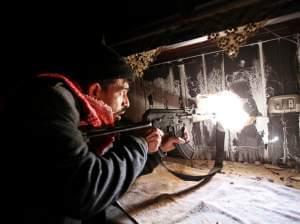
She covers her hair with a hijab, or a stocking cap, or sometimes a helmet. She has sharp eyes and a sly smile. But probably the most striking thing about Noor is how calm she is in the face of chaos.
As we got out of the car in a bombed-out neighborhood during that first trip, she led us around like we were on a tour. We started to hear shelling and gunfire, but Noor was unfazed.
"We're not even close to the front line yet," she said.
She walked us to what she called the back of the front line. It was the backside of a building. The only thing separating us from the front line was the building.
We started asking questions about a guy who was killed the day before. Turns out Noor knew him. He had been part of a team of rebel fighters, known as the Free Syrian Army, which helped pull the body of an old man out of some rubble. A government sniper had shot the man in the chest and killed him.
Noor says the rebel fighter provided cover by shooting at the government sniper. "At the same moment, two rebels ran into the street, dragged the body, and that's it."
Noor photographed the whole thing — the body of the old man being dragged out and the rebel who was shooting to provide cover. Now the rebel shooter is dead.
As we walked through the rubble of the ruined streets, she remembered him — her voice showing no emotion.
"He went to see his family last Saturday ... and then he came back here the next day. And he died," she said.
An Accidental War Photographer
It's this kind of experience that gives Noor credibility with the rebels in Aleppo. It means they give her access, and good access means good pictures.
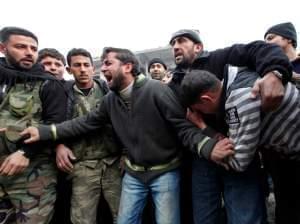 When the Syrian uprising started nearly two years ago, Noor was a recent college graduate teaching English in a private school.
When the Syrian uprising started nearly two years ago, Noor was a recent college graduate teaching English in a private school.
Protests kicked off around the country, but not the northern city of Aleppo, Noor's hometown.
That's because the business-minded city was more concerned with survival than politics. Noor says she'd go to protests that lasted only five minutes.
Then some in the protest movement took up arms, and last summer those rebel fighters brought the fight to Aleppo. At first, Noor did what she calls "woman things" — cooking for the rebels.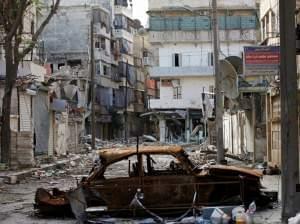
Then she offered to record one rebel unit's battles and upload the footage to the Internet. She says it was her way to help the cause.
"The camera is as equal as a weapon," she says. "And you need to document every single thing that's happening. Because back in the '80s, when we were in similar situation, nobody had any idea about what was going on in Homs and Hama," she says, referring to a brutal crackdown by then-President Hafez Assad, father of Syrian's current president Bashar Assad. Tens of thousands of people were killed then.
Noor believed her new role was to make sure similar atrocities don't go unreported.
Last fall, a well-known war photographer with the Reuters agency, Goran Tomasovic, spotted Noor shooting pictures with her cell phone. He trained her for a week on how to use a professional camera, then gave her a few of his cameras to keep. She's been sending pictures to the agency ever since.
It's not an easy job. One day Noor was shooting pictures of the aftermath of a bombing by a government plane. The jet circled back around and came in low. Rebels fired at it with two doshkas, a Russian name for large-caliber machine guns.
"I felt so safe because usually ... when the doskha starts firing at the jet, the jet would go up high and not come back again," she says.
But that's not what happened this time. As rebels fired the doshkas, Noor couldn't hear that the jet was coming even closer. She pulled her face away from the camera to see that everyone else had hit the dirt.
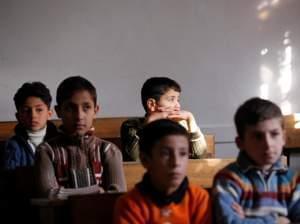 "And they said, 'It's getting lower! It's getting lower!' It was the jet firing at the doskhas. Firing bullets," she says.
"And they said, 'It's getting lower! It's getting lower!' It was the jet firing at the doskhas. Firing bullets," she says.
Noor pulled her cameras in tight, turned her back on the plane and ran to hide behind some sandbags. As she did, she took shrapnel across her leg and back.
"I thought I was waiting for death," she says. "Because all I was thinking about is that the jet is going to throw its big bomb now, and we're going to die in pieces."
That didn't happen. For whatever reason, the jet flew away. In the end, Noor's injuries were relatively minor.
Working Despite The Risks
In conservative parts of Aleppo, it's very strange for a young, unmarried woman to be running around with a bunch of guys, let alone guys with guns.
 But Noor says she doesn't care if people gossip. She says her family supports her, and that's all that matters.
But Noor says she doesn't care if people gossip. She says her family supports her, and that's all that matters.
On the day Noor took us to the front line, rebel fighters stormed her family's neighborhood, where her mother and three siblings still lived. Government troops responded.
As we drove around, Noor frantically tried to call her mom to see if she was alright. She asked us if we could give the family a ride out of the city.
It was sundown by the time we finally found them.
They had made their escape from the neighborhood and were standing on the street with what looked like everything they owned.
Noor's mother smiled and chatted as if nothing was wrong. An older aunt didn't do so well. Inside the car she rocked back and forth, grabbing my knee and repeating prayers of thanks.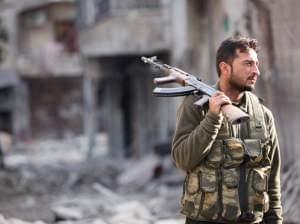
Some news organizations have stopped taking work from freelancers in Syria. They say doing so only encourages young, inexperienced and uninsured reporters to risk their lives.
But even if she weren't sending pictures to Reuters, Noor says she would do this work anyway.
When we last saw her, Noor said she was planning on setting up a kind of media center that would help her and other Syrians connect with foreign journalists.
But then, something happened.
Just last week, rebels launched an offensive in another front-line neighborhood. A few days later, Noor went to shoot pictures there.
A government tank fired and hit a wall. The wall collapsed on Noor. She came to amid a cloud of dust. The bones around her ankle were broken. She is now being treated in a hospital in Turkey.
Noor told us the attack has only strengthened her resolve. Once the leg heals, she says, she hopes to be back at the front lines.

